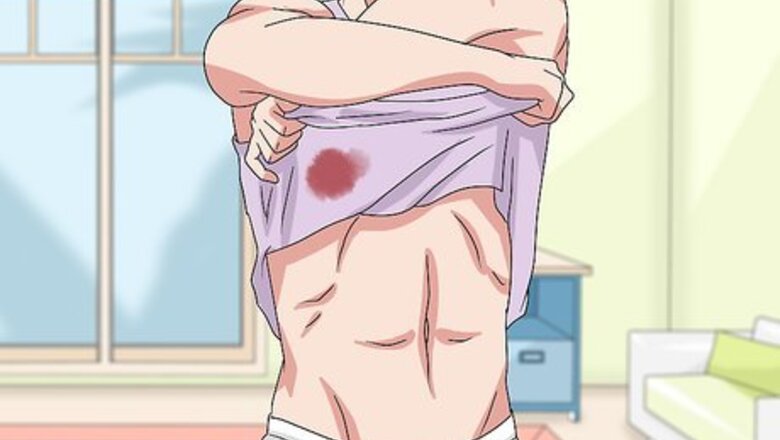
views
Removing Stains from Clothing
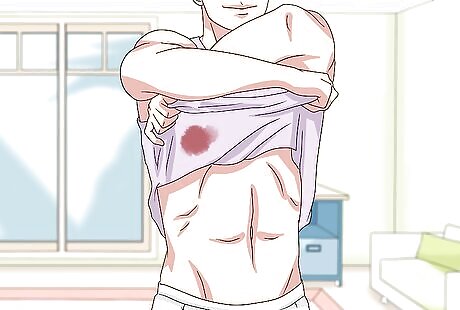
Remove the clothing item as quickly as possible. The longer a stain is left to set, the more difficult it will be to remove. If at all possible, remove the stained clothing item immediately. If clothing cannot be removed immediately, at least try to remove excess food immediately, and coat the stain in cool water. Be careful while removing the offending item, as you do not want the stain to transfer to multiple areas. To prevent this, you can cup your hand over the stain as you remove it.
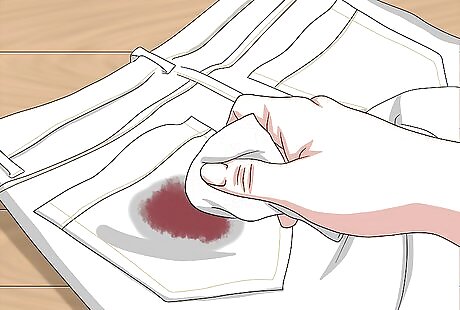
Blot the area with a clean, white rag. Once the garment has been removed, blot the area using a clean, white rag. Gently dab at the stain, avoiding a wiping or scraping motion, as these can bury the stain deeper into the fibers. Your rag can be damp or dry, but for this step, avoid an extremely wet rag. The goal here is not to transfer water, but to remove any lingering tomato residue.
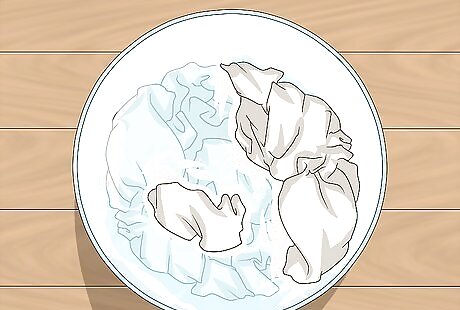
Soak the stain in cold water. Fill a sink or small basin with fresh, cold water, and place the stained article of clothing into the water. If the stain is small, you can place the stained area into the cold water, instead of the entire garment. If you are using the sink, make sure to clean it thoroughly before using it for laundry. Stains transfer to fabric easily, so you do not want any debris left in your sink.
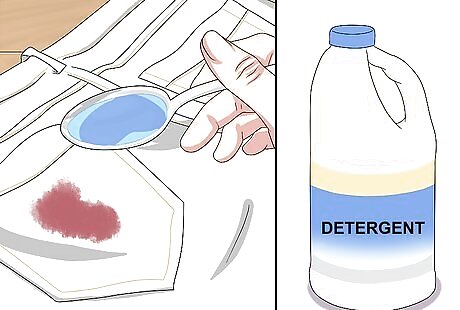
Place laundry detergent on the area. Place a dab of laundry detergent onto the area and rub it in using your fingertip, making small circles. After 5 minutes have passed, rinse the area in cool water. If the stain is persistent, you can reapply the detergent and try again until the tomato stain has been eliminated.
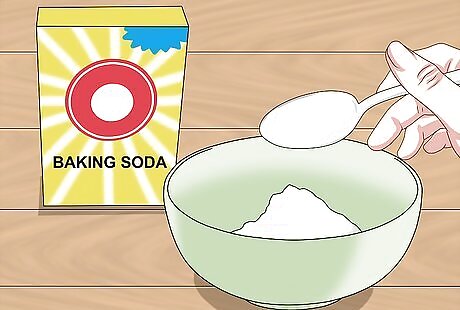
Try a less traditional cleaner if necessary. If you want to try using household items to get rid of tomato stains effectively, you can use any number of remedies found in your kitchen cabinets. Typically, the best way to go about this is to make a paste and rinse in cool water. Create a paste of water and cream of tartar. Apply this paste directly to the stain, then rinse with cool water. Baking soda, salt, and water. Similar to cream of tartar, create a baking soda, salt, and water paste, then apply it directly to the stain. Let it sit for 10 minutes, then rinse it out with cool water. Blue Dawn dish soap can be used. Apply a pencil eraser-sized amount of Dawn soap to the stain, rubbing it in with your finger. Rinse the stain in cool water until the water runs clear and no more soap bubbles are visible. The dish soap helps remove the oil from the fabric.
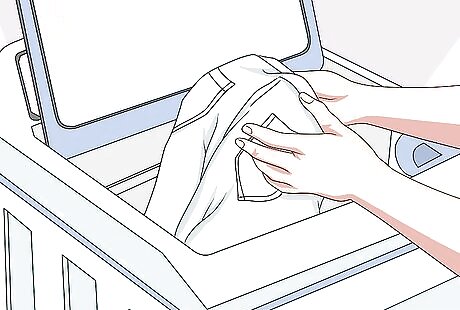
Wash the item in cold water. After applying your stain treatment, place the garment in the washer, using the cold water setting. If it is a large stain, you may want to place the garment in the washer on its own to prevent transferring the stain to another garment. Look closely at the item after removing it from the washer. If the stain is still there, treat it again before drying it. Sun and heat can actually set the stain.
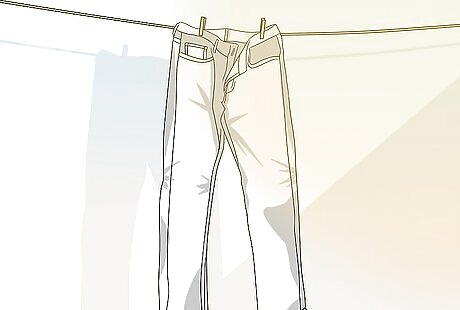
Air dry the garment in the sun. After the wash cycle has finished, remove the clothing item and place it in the sun to dry. This will speed the drying process and help remove any residual staining. If the garment has already been dried and the stain is set in, try rubbing the area with dish soap, an ice cube, or a white cloth moistened with vinegar. Then, launder the item again.
Removing Stains from Carpet
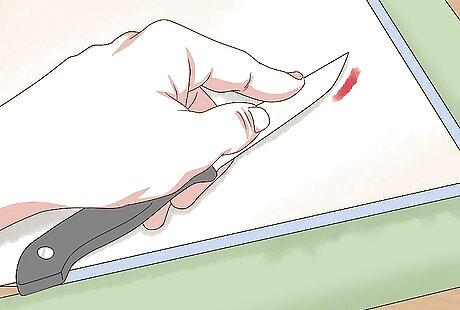
Scrape up any excess sauce. The difficulty of removing a stain will depend largely on your carpet pile. A high pile may require more than a knife or spatula to remove sauce, and may require a small rag, while a low pile should be just fine with a knife. Make sure all large pieces of food and piles of sauce are gone before moving to the next step, as blotting with a lot of sauce intact may make the stain worse.
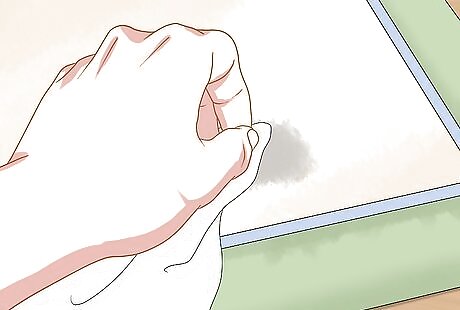
Blot the area with a clean, damp rag. Take a damp, clean white rag and dab at the stain, pressing firmly into the stain. Do not wipe or scrape with a rag, as this can force the food particles further into the carpet and make them extremely difficult to remove. Make sure to use cold water while blotting. Warm or hot water can encourage food particles to set.
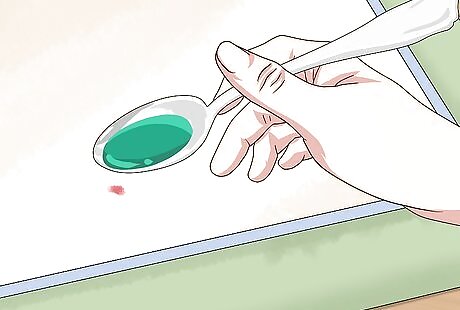
Place stain remover onto the carpet. Carpet is not quite as versatile as clothing in terms of stain treatment. Stick to the basics here: peroxide, Dawn dish soap, or a dedicated carpet cleaning product. Apply a capful of peroxide to the area, working it in gently with your fingers. If a large area is stained, spray a mixture of water and peroxide onto the carpet. Let it sit for 5-10 minutes. Place a pea-sized amount of Dawn dish soap onto the stain, or spray a solution of dish soap and water onto the carpet. Gently rub the soap in circles, using a small toothbrush or laundry brush. To use a carpet-cleaning product, simply follow the product’s instructions after removing additional liquid.
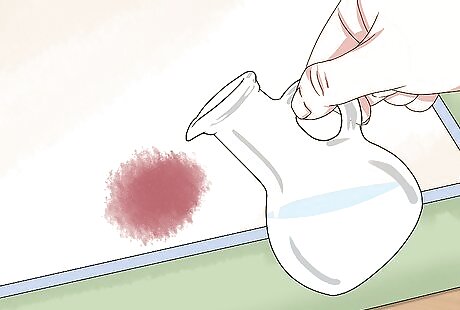
Rinse the area using a small cup of water. While you cannot rinse carpet under running water, you can flush the area out using a small cup of cold water. Gradually pour cool water onto the stain, blotting up excess moisture as you go, and lifting the stain and spot treatment. For a small stain, 1 C (8 oz) of water will do. For larger stains, double the amount.
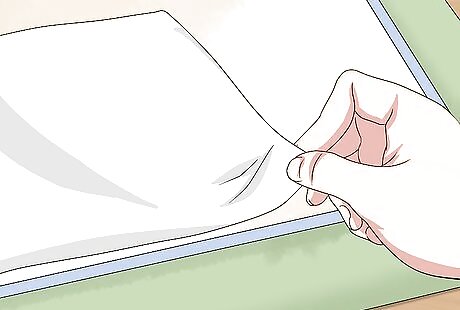
Dry the carpet using a towel and pressure. To dry your carpet, place a clean towel atop the stain and press down using firm pressure. Continue this process until all of the moisture has been lifted. Once the stain has been removed, you can turn on a ceiling or floor fan to speed up the drying process. Or, use a shop vacuum to suck up the water.
Removing Stains from Furniture
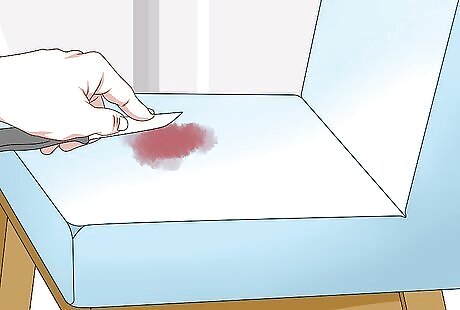
Gently wipe up remaining sauce or tomatoes. Using a spatula or putty knife, wipe up any sauce or tomato residue that has been left behind. Make sure you use an item with a clean, straight edge to wipe, as wiping with cloth or a jagged edge could set the stain further.
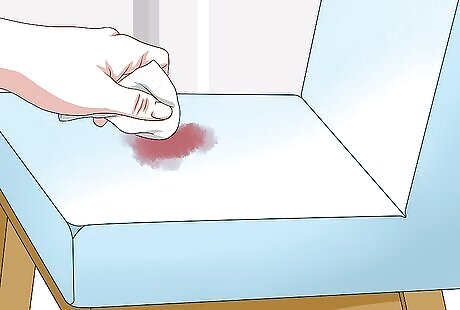
Blot the stain using a damp, white rag. Dampen a clean white rag with cold water, and blot the stain, going over it several times until the stain has grown light in color. Using a colored rag could result in the transfer of color, so avoid colors or patterns.
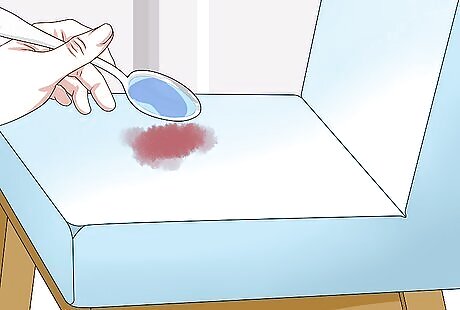
Apply dish soap to the area. Apply a small drop of dish soap to the stain, and rub it in small circles using a brush or your finger. Be careful to only rub directly on the stain, as rubbing outside of the stain’s diameter could transfer the stain to a larger area. Some fabrics such as wool may react poorly to dish soap. Check your furniture’s cleaning instructions to avoid damaging the fabric.
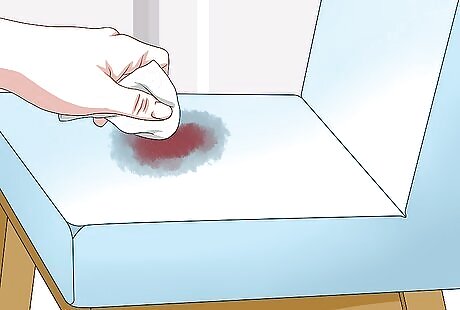
Blot it again with a damp rag. Blot the stain with a damp rag to remove soap bubbles. You can use a gentle wiping motion if the soap bubbles are stubborn, but be sure to wipe carefully and lightly, without putting any undue pressure on the fabric. If your first blotting rag does not have a significant clean space, use a new rag. You don’t want to transfer the stain back onto your fabric.
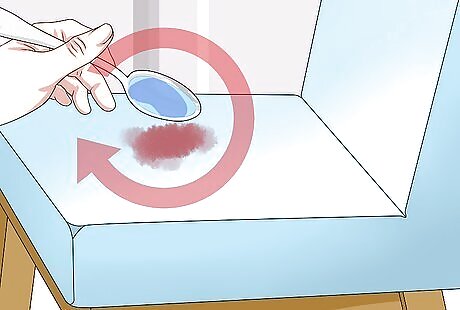
Repeat the soap application, if necessary. If the stain is still visible, repeat the process, applying a small amount of dish soap, rubbing it in, and removing the remaining soap with a damp rag.
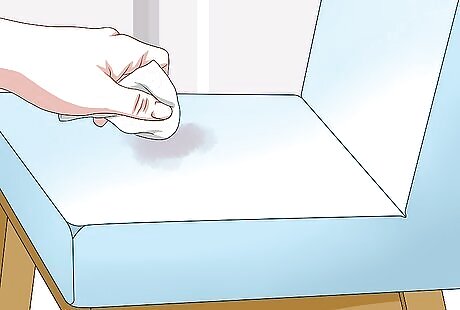
Blot the area dry with a clean towel. Once the stain has been lifted, blot the area dry using a clean, white towel. Place the towel directly over the area and apply firm pressure, repeating this process until the fabric is dry to the touch. Avoid pouring water onto the furniture, as this could wet the pad beneath the fabric and result in mold or mildew. Stick to a damp rag for removal.



















Comments
0 comment